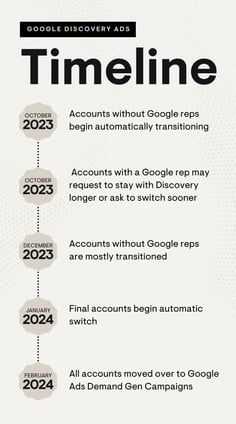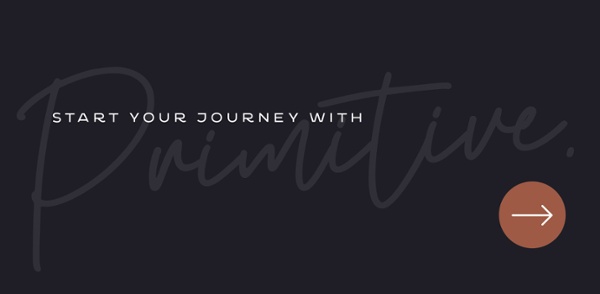BLOG Moving From Google Discovery Ads to Google Ads Demand Gen Campaigns.
Moving From Google Discovery Ads to Google Ads Demand Gen Campaigns.
POSTED BY Danielle Holmes | Sep 13, 2023

Have you heard that Google is making upcoming changes to Google Discovery Ads? Do you wonder what that means for you and your business? Don't worry; we'll cover everything you need to know here.
Google Demand Gen Campaigns will soon replace Google Discovery Ads. This change will officially start in October of 2023. For most business owners or marketers, this isn't something to be worried about because the switch will happen automatically—no action is required to make the transition. But, when it comes to your business marketing, we all agree that surprises are rarely fun. Ten out of ten marketers agree the best change is the one you plan for.
What Are Google Discovery Ads?
Google Discovery Ads appear on the Google Search Network and the Google Display Network. These ads encourage users to engage with your brand rather than directly convert them into customers or leads. Discovery Ads include images, headlines, and descriptions, making them highly engaging for users.
Why is Google Making the Switch from Discovery Ads to Demand Gen Campaigns?
Google Discovery Ads had their merits, primarily rooted in their engaging formats. These ads leveraged visuals, headlines, and descriptions to captivate audiences, providing an aesthetically pleasing and immersive advertising experience. They extended their reach across various Google platforms, including YouTube, Gmail, and the Discover feed, ensuring exposure to a broad and diverse audience.
Google Discovery Ads Reach Across Google Platform Includes
- Traditional YouTube videos
- Gmail
- Discover feed
However, Google Discovery Ads had their limitations. The degree of keyword control was restricted, limiting precision in targeting specific search terms. Audiences encountering these ads had lower levels of purchase intent, resulting in lower conversion rates. Success with Discovery Ads heavily relied on the quality of visual content and creative design, making it challenging to guarantee consistent performance, especially for small advertising teams with limited access to copywriters, graphic designers, and videography teams.
Where Googe Discovery Ads Didn’t Get It Right
- Limited keyword control
- Audiences with lower purchase intent
- Reliance on client-created visual content
What is Google Ads Demand Gen Campaigns?
Google’s newest ad product takes what Discovery Ads got right and levels up. Google Ads Demand Gen Campaigns introduce a highly targeted and intent-focused advertising strategy within the Google Ads ecosystem. These campaigns prioritize precision. This allows advertisers to finely tune their keyword selection to reach a specific audience actively searching for their products or services.
Google Ads Demand Gen Campaign Features You Should Know
Keyword Precision
Demand Gen Campaigns provide meticulous control over keywords, allowing you to reach an audience actively searching for your products or services. This precision significantly improves the relevance of your ads. Demand Gen campaigns enable precise keyword targeting, allowing you to bid on keywords related to your product or service to capture potential customers.
Intent-Driven Targeting
These campaigns prioritize targeting users who exhibit clear signs of interest in your offerings. By connecting with potential customers further along the purchase journey, Demand Gen Campaigns increase the likelihood of conversions. Demand generation campaigns in Google Ads allow you to target specific demographics, interests, and keywords, helping you reach an audience more likely to purchase your product or service.
Content Focus
While visual appeal remains essential, the success of Demand Gen Campaigns is less reliant on flashy visuals and focuses more on understanding and addressing your audience's needs and desires. This approach fosters deeper engagement and meaningful connections with your customers. You also have a variety of ad formats to choose from, including text ads, display ads, and video ads. All ads are customized to suit your campaign goals.
Conversion Tracking
Google Ads provides robust conversion tracking tools, making it easier to measure the ROI of your demand gen campaigns and optimize for better results. And if you’re unsure how your audience will respond to your ad, the ad preview and A/B testing features are helpful.
When will Google Ads Demand Gen Campaigns changes take effect? 
You can expect the shift from Google Discovery Ads to Google Ads Demand Generation Campaigns to start in October 2023. If your account doesn’t have a Google rep, expect to be automatically switched over first. Complex accounts with Google Reps may be able to stay with Discovery Ads till the end of January 2024. Preparing your digital marketing and advertising strategies is crucial as this deadline approaches. Ensure a seamless transition that allows your business to harness the strengths of Demand Gen Campaigns by doing your research OR connecting with an agency with Google Ads specialists.
Is There a Benefit to Switching Now?
Switching to Google Ads Demand Generation Campaigns before the automatic transition gives you more control and better results. You can adjust your advertising strategy to fit your needs, like improving who sees your ads and what they say. Being proactive helps ensure your campaigns perform well from the start. It's the difference in party pictures when someone spoils a surprise party to give you a chance to pick your clothes and style your hair—the difference is noticeable in the moment and after the fact.
As Google phases out Discovery Ads, start preparing for the transition. Switching to Google Ads Demand Gen Campaigns empowers you to tailor your advertising strategy, refine targeting, optimize keywords, and ensure effective messaging. Take charge of your marketing journey, and navigate the changes with confidence.
SHARE THIS POST:

About the writer, Danielle Holmes
Danielle has been telling stories her whole life. And for the last five years she’s been telling the stories of entrepreneurs, small businesses, and companies bringing quality products and services to customers. Danielle got her start in academia. With degrees in English and anthropology, she spent more than half a decade learning how to ask questions, tell stories, and do thorough research. Her approach uses ethnographic interview and coding techniques to better understand brands and clients. She listens for key words, recurring topics, and core ideas to know the client and their ideal audience. She uses that data and understanding to tell stories—true to brands—that create loyal customers.

